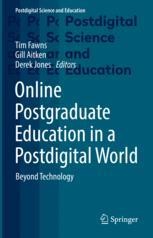What Is the Matter With PGT (postgraduate taught education)?
If there is no soul in computer-music then it’s because nobody put it there. (Bjork 2019)
Online learning has been identified as a key growth area for the higher education sector, often without a realistic consideration of resource requirements, or an appreciation of the transformative value that online education can have for students. Two common views about online learning are that communication and relationships are inherently poorer online; and that online learning can be scaled up without significant additional cost. These blunt depictions of online learning as a unified concept, with inherent properties, can be seen in policies, advertisements, blog posts, social media comments, and even in educational research.
Even before the Covid-19 pandemic, online postgraduate taught (PGT) education (e.g. Master’s, and Postgraduate Certificates and Diplomas) was growing rapidly, as professionals around the world looked to build knowledge and skills that contribute to personal and collective development. Yet online PGT education remains under-theorised, and the quality of these programmes often suffers from approaches that have been developed for on-campus and undergraduate education. Some other online approaches use simplistic models where learning is seen as instrumental, and relatively independent of the practice and influence of educators.
For us, in our context of taught postgraduate programmes, ‘online’ is a place where meaningful relationships, based on trust, can develop. Our students, through dialogue with an interdisciplinary and international online community, have developed critical and analytical ways of thinking that have extended their capacity to influence practice and policy in their local settings. However, building an academic community takes time, and becomes increasingly difficult amidst a global, market-led, neoliberal drive for Universities to dramatically increase numbers of students. This puts considerable pressure on teaching staff, and poses risks for the quality of education.
A Postdigital Perspective
A postdigital perspective can help us to see that online education must account for a complex integration of digital, social and material elements, and reject reductionist approaches to growth in online learning. It helps us to challenge perceptions that experiences of online learners are limited by distance or technology. Rather, we argue, the limiting factors are time, policy, infrastructure and pedagogy. We have seen many cases in our own programme (Edinburgh University’s MSc Clinical Education) and elsewhere, where strong and trusting student-teacher relationships exist in the absence of “face-to-face” interactions; where technologies are used thoughtfully and effectively to support social presence, communication, and understanding of our students.
Teaching online is not the same as on campus teaching. There is a significant adjustment and learning curve involved. However, the differences are often oversimplified. The primary challenge is in adapting principles and practices of teaching to encompass new and multiple contexts, rather than because online is a separate domain, or because it is inherently more socially-impoverished, isolating, or flexible than face-to-face teaching.
What is needed is the development of a wider repertoire of approaches and practices, and a more critical conception of teaching that looks beyond crude categories of methods (e.g. lectures, tutorials, problem-based learning, or online learning, to see it as a potentially unbounded mix of diverse, subversive, and unpredictable, digital and non-digital interactions.
Online Postgraduate Education in a Postdigital World: Beyond Technology
 The third book in Postdigital Science and Education book series, Online Postgraduate Education in a Postdigital World: Beyond Technology edited by Tim Fawns, Gillian Aitken, and Derek Jones, explores the ways in which online PGT programmes extend beyond digital spaces, and the implications for educational policy and practice. It ties together a range of themes to create a rich picture of what happens on online postgraduate programmes, the factors behind successful practices, and how these can contribute to individual and collective change. It combines empirical and theoretical chapters, underpinned by critical perspectives that resist instrumental assumptions about technology.
The third book in Postdigital Science and Education book series, Online Postgraduate Education in a Postdigital World: Beyond Technology edited by Tim Fawns, Gillian Aitken, and Derek Jones, explores the ways in which online PGT programmes extend beyond digital spaces, and the implications for educational policy and practice. It ties together a range of themes to create a rich picture of what happens on online postgraduate programmes, the factors behind successful practices, and how these can contribute to individual and collective change. It combines empirical and theoretical chapters, underpinned by critical perspectives that resist instrumental assumptions about technology.
The chapters of the book build on the premise that online learning is not separate from the social and material world, and is made up of embodied, socially meaningful experiences. The book, as a whole, is founded on a ‘postdigital’ perspective, in which, much more than interactions with keyboards, computer screens, hardware or software, the learning that happens on online postgraduate programmes spills out into professional and informal settings, making connections with what comes before and after any formally scheduled tasks.
Unlike other books relating to online education, Online Postgraduate Education in a Postdigital World: Beyond Technology combines a theoretical perspective, in which the digital, physical and social are all interconnected within complex educational ecologies, with a focus grounded in postgraduate practice. This focus has important implications for the kinds of students and learning that are explored in the chapters of the book. These students are, predominantly, studying part-time, while working as, potentially, senior professionals with significant practical responsibilities. They are diverse in terms of location, cultural backgrounds and settings, material infrastructures, age and life circumstance. They are often studying advanced concepts and developing capacities for critical appraisal, engaging with issues of social justice and ethics, and questioning the structures, policies and politics of their workplaces and disciplines.
These characteristics influence the considerations of teaching, course design, evaluation, policy and governance, and faculty development, and it is these considerations that constitute the primary contribution of this book. Our aim is to provide a holistic picture of these various considerations and their combination, in relation to what is required to produce good quality, online postgraduate programmes.
Our focus on the postgraduate context differentiates Online Postgraduate Education in a Postdigital World: Beyond Technology from other books, because of the important implications for the kinds of students (part-time, professional and potentially experts in their field, internationally dispersed, different life circumstances). It also caters for the needs of both those new to online education, more experienced practitioners who are looking to expand their repertoire of approaches, and those seeking more critical and theoretical perspectives.







